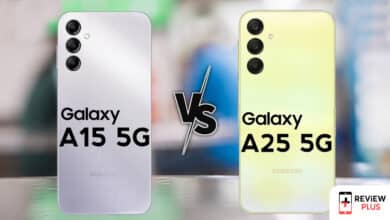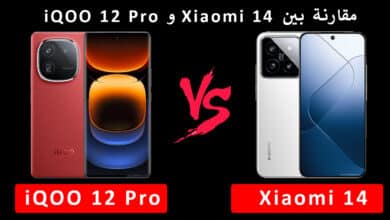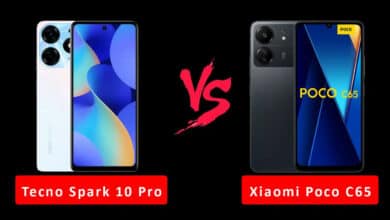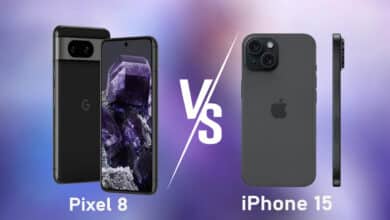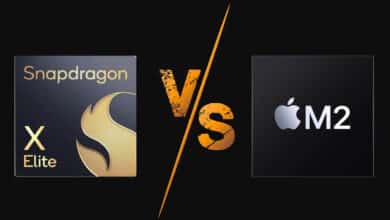In this comparison, we clarify the difference between the Google Pixel 8 Pro and the Google Pixel 7 Pro and highlight the new advantages of Google's new flagship phone.
Comparison between Pixel 8 Pro and Pixel 7 Pro
The series of leaks has ended and Google has put a final end to the wild rumors that have continued over the past few weeks and officially revealed the Google Pixel 8 series on October 5, 2023, which includes two new phones, the Pixel 8 and Pixel 8 Pro.
If you are interested in iOS, you will find us on Review Plus iPhone 15 VS iPhone 15 Plus VS iPhone 15 Pro VS 15 Pro Max A comprehensive comparison and clarification of the most notable differences.
Without a doubt, the latter is the best and most powerful Google phone ever, which brings with it many notable upgrades in terms of performance, battery life, camera capabilities, and some nice technical touches to the body and durability standards. But these updates were not cheap, as the phone comes at a higher cost than its previous predecessor by $100, which is certainly not an insignificant difference.
The Pixel 7 Pro is still one of the best Android phones to date, and it has an impressive array of perks that make it a profitable deal in all cases. If you own a Pixel 7 Pro, you may be wondering whether upgrading to the Pixel 8 Pro is a good idea in order to enjoy up to 7 years of software support for Android systems if you can just stick with the Pixel 7 Pro and get used to 5 years of official support.
So that you do not feel too confused, we have created this comparison to clarify the most prominent and important differences between both phones, and so that you can ponder your affairs before thinking about upgrading to either of them. Follow this guide until the end to determine if you really need to upgrade to the Pixel 8 Pro and other reasons why the Pixel 7 Pro is still a good option in 2023.
It is better to buy Google Pixel 8 Pro in the following cases
To facilitate the comparison process between both phones, we will try to highlight the most important cases in which the process of upgrading to the Google Pixel 8 Pro is a logical idea and a necessary upgrade.
First: If you need new camera upgrades

Google Pixel phones have long been known as one of the best Android phones in terms of camera capabilities and professional editing features, even if they do not have a high rating on the DXOMark website, but they are still among the most powerful and best phones equipped with high-quality cameras.
And the Pixel 8 Pro will certainly not be an exception. In fact, the camera on the Pixel 8 Pro has been upgraded in a number of different aspects and the aperture size on the main sensor has been increased to capture more light and improve the photography and video recording experience in low-light conditions.
The camera setup on the Pixel 8 Pro has got some impressive perks like a 50-megapixel Octa PD sensor with an f/1.68 aperture. This is the same sensor already used in the Pixel 7 Pro, but increasing the lens size helps the new flagship absorb more light and improve image quality. In dark areas.
While the basic resolution has not changed on the main sensor, the wide-angle camera has received a noticeable upgrade and is now supported by 48 megapixels instead of 12 megapixels. Therefore, the new ultra-wide lens will play a prominent role in improving group shots and landscape photography that will appear more realistic and of higher quality.
Both phones, the Pixel 7 Pro and Pixel 8 Pro, contain a third telephoto lens, which operates at a resolution of 48 megapixels and is capable of 5x optical zoom. But just like the main sensor lens, the aperture on the telephoto sensor has been improved and enlarged to f/2.8 instead of f/3.5. However, both are still supported by OIS and phase-based autofocus (PDAF).
Google has beefed up the camera setup on the Pixel 8 Pro across the board, including the ultra-wide lens. But the most notable feature of the camera setup is that all lenses have larger apertures in order to improve the brightness of stills and video recordings in low-light conditions and enhance longer depth ratios in order to make the blurry background appear more realistic while shooting portraits.
Second: If you wish to have a bright blue or ceramic color

The Pixel 8 Pro has arrived with some eye-catching and surprising new color options. The light blue color may be the source of interest, which the company calls Bay, while there is still another no less important color, which is Porcelain, which is a mixture of golden and yellow touches. Obsidian Black is still an option like it was on the Pixel 7 Pro.
As for the Pixel 7 Pro phone, it comes in completely different shades of color, including ice, cream, honey, and a darker level of light blue. Therefore, although there are some noticeable differences in the technical specifications of the phone, which are supposed to be decisive factors in justifying the choice of either of them, the issue of color preference will remain among those factors as well.
The idea of choosing colors is still a matter of personal preference, but for me personally, I definitely prefer the new colors on the Pixel 8 Pro. But in the end, you are definitely the one who will decide here.
Third: You will benefit from the new temperature sensor

Well, here things get a little complicated because Google did not go into details about the temperature sensor on the Pixel 8 Pro, despite some useful uses that it also stated.
This sensor can be used to measure the temperature of food, organic foods, hot drinks, water, cast iron, glass, ceramics, shiny and matte metals, fabrics, wood, rubber, plastic, walls and windows.
These have many very useful uses. For example, but not limited to, you can simply measure the temperature of the baby's bottle before handing it to him. But on a medical level, this is amazing data for having a second-class medical device - as The Verge points out.
But what about body temperature? Is this sensor sufficient to accurately display body temperature? This is why we said that things get a little complicated here.
Of course, body temperature sensors need to obtain approval from the World Health Organization before they can be approved to measure human body temperature.
But Google is not required to obtain this permit for smartphones, at least in theory. It doesn't need to because it doesn't promote the sensor as being designed to measure body temperature.
Many technology companies use infrared temperature sensors in a wide range of products, including smartwatches and other wearable devices. But temperature sensors inside are used to track sleep quality and women's ovulation cycles. However, this data is not promoted as body temperature.
Therefore, there is no objection to using these sensors to measure your temperature, but you must pay attention to an important thing, which is that the information you will receive cannot be trusted as the actual body temperature.
Instead, you can think of this data as the surface temperature of your forehead or skin, not your internal body temperature. You are expected to get varying readings every time you try to use the device to measure your forehead temperature. Yes they may vary, but they will be within the same range at the same time, which means they are already accurate readings from the infrared temperature measuring sensor.
We wished Google had gone into some precise details about the uses of this sensor and the limitations it is exposed to in daily use. But as long as you feel that you may benefit from this sensor in some scenarios, it is truly a revolutionary leap in the world of smartphones, and it is expected that it will be improved over time to provide more accurate readings.
Read also: iPhone 15 VS Samsung S23 Compare specifications and prices
It is better to buy Google Pixel 7 Pro in the following cases
The Pixel 7 Pro is still one of the best smartphones out there right now even though it has been around for almost a year now. There are a number of possibilities that make it the perfect upgrade for most users or if you already own it, upgrading to the Pixel 8 Pro may not be a smart idea if you don't need all the new perks we mentioned above.
In any case, if you are purchasing a new Android phone, investing in a Pixel 7 Pro may make more sense in the following cases:
Want to save some money?

Savings are one of the crucial factors that anyone who buys a new product, especially smartphones, thinks about at length. The Pixel 8 Pro phone is sold for $999 US dollars, which is certainly a huge amount, especially when you calculate the difference in local currencies in a large number of Arab and European countries.
While you still have the Pixel 7 Pro phone sold on Amazon for about $200 cheaper, and not only that, you can get a refurbished phone for $499 as well.
The Pixel 7 Pro phone is still new to the market, even a year after its launch, but it is available in all online stores and retailers.
It shipped to the market with Android 13 and guarantees you a version of Android for five years, which means it will be eligible for Android 18 in the future.
Of course, the Pixel 8 Pro is still the best in practical terms because it is backed by seven years, which means it is even better than iPhones backed by five years of updates.
But in practice, it's impossible for anyone to continue using the same phone for more than five years, which means you definitely won't need the Pixel 8 Pro that long before you consider replacing it with a new phone.
Therefore, even with the difference in software support period that the Pixel 8 Pro has, the Pixel 7 Pro is still the best for long-term use because you will definitely decide to buy a new phone before 2028.
The idea here is that with the new launch of the Pixel 8 Pro, the price of last year's model drops significantly around the world, making it a good and profitable deal in any case.
You don't need all the new perks on the Pixel 8 Pro

Regardless of the cost difference, the Pixel 8 Pro is considered one of the best and most powerful new Android phones. It has a Tensor G3 processor and an enhanced Titan M3 internal security chip.
The processor is still less powerful than the leading Qualcomm processors on both levels: the computational performance of the central processor and the graphic processing of the graphics processor.
But Google does not pay much attention to computer processing performance as much as it cares to focus on artificial intelligence applications. In all cases, the performance of the Tensor G3 processor is more than sufficient to handle all tasks and advanced Android games. But it did not bring more improvements in various aspects compared to the Tensor G2 processor that is already inside the gut of the Pixel 7 Pro.
So, in terms of performance, the new processor cannot be a powerful influence factor to push the user towards the Pixel 8 Pro. Instead, the Tensor G2 processor is a more than excellent choice for performing real-world tasks.
The Pixel 8 Pro phone comes with some nice design touches, and has a second generation Victus 2 glass protection layer from Corning. But the difference between the second generation and first generation Victus Glass is not noticeable in any real way.
The screen hasn't changed much either, it's still super high resolution. But the advantage goes to the Pixel 8 Pro in brightness rates that reached 2400 nits, which makes it brighter than the previous version by 900 nits. However, with the 1,500 nits brightness on the Pixel 7 Pro, you won't have any trouble seeing the screen when you're outside or in direct sunlight.
We bring photography and video recording capabilities. Yes, the Pixel 8 Pro has some commendable upgrades in terms of camera capabilities. The main sensor has not changed in accuracy, but the lens aperture has become significantly wider, making it able to provide better results in photos and video while shooting in dark environments and areas.
We return to the Pixel 7 Pro, which still has one of the best main cameras ever. It's just as accurate and is also able to capture light brilliantly in low-light environments.
The question now is, will you need the 48-megapixel ultra-wide lens on the new model, or can you be satisfied with the 12-megapixel lens on the previous version? As for the telephoto lens, it has not changed and is still capable of 5x optical zoom.
So, in the end, while Pixel 8 Pro buyers may enjoy more entertainment features like a temperature sensor, improved camera, better colors, higher screen brightness rates, more advanced AI capabilities, or up to 1TB more storage capacity, the phone is still the same phone. Basic features remain unchanged such as RAM size and battery capacity.
Most people only want to upgrade to a new phone to improve the user experience and extend the amount of time the phone can provide during outdoor use. If battery capacity doesn't improve by much, it should at least have faster charging to get your attention. Unfortunately, this did not happen with the Pixel 8 Pro. Wireless charging speed remains the same, and the 7W faster wired charging won't make any real difference.
To also be honest and fair, we should thank Google for the 1TB capacity of the new model, which will come in very handy for local storage for some users especially those who prefer to store high-quality content on the phone to enjoy on the go. But do you really need this capacity, especially since it makes the phone more expensive by a significant margin?
Read also: The difference between Apple Watch 9 and Ultra 2:Is the upgrade necessary?
Conclusion
In the end, you must decide for yourself whether you want to upgrade to the Pixel 8 Pro phone and you will be able to achieve the greatest amount of benefit from its new features, or to be satisfied with the Pixel 7 Pro phone and avoid spending a very large amount of money on an upgrade that may not be useful for your uses. Daily.
While the attractive new color options on the Pixel 8 Pro will make some people excited about the upgrade, in most cases, you'll be keeping the phone inside a case, and color becomes a less important factor in determining the phone's true value.
The Pixel 7 Pro's cameras are still more than excellent in all scenarios, and the telephoto lens remains unchanged. Battery life and wireless charging speed were also unaffected.
Five years of software support for the Pixel 7 Pro phone is a very long period that gives you the opportunity to manage your financial affairs and save enough money to upgrade in the coming years without feeling any pressure on your financial situation.
But if budget is not a concern for you, you want the latest in smartphone technology, and you have a feeling that the Pixel 8 Pro is the best phone that is worth your money, then who are we to stand in your way and prevent you from getting the best phone? Android phones ever.

